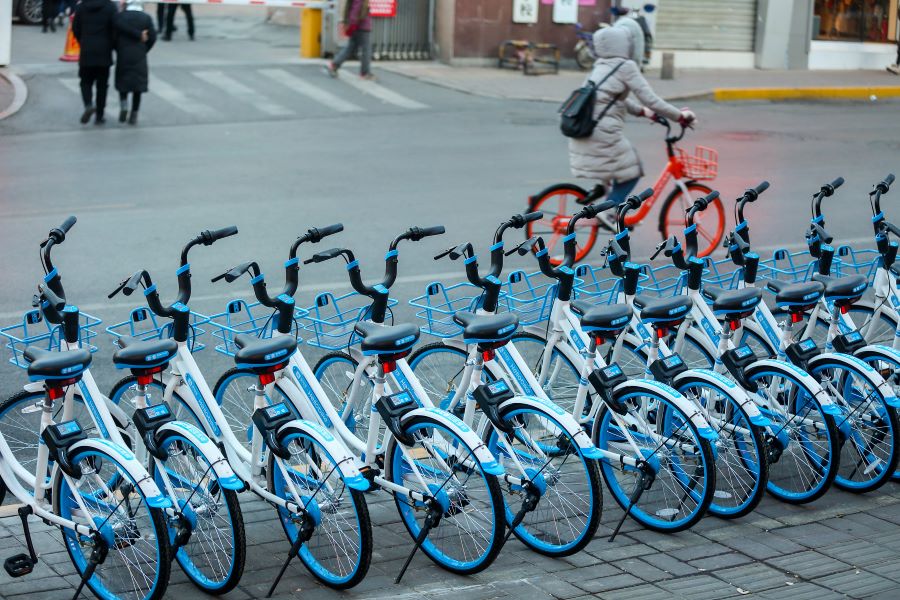Shared Bike Specialist Hello Inc. Could Meet Skeptical Reception on Wall Street

Company backed by Alibaba’s Ant Group continued to post large losses last year as its revenue growth slowed sharply
Key Takeaways:
- Hello Inc.’s relatively high costs and standalone nature of its shared-bike service could make it difficult for the company to become profitable
- Those factors mean Hello could be valued at a medium-to-large discount compared to domestic peer Meituan and U.S. giant Uber
By Doug Young
Hope certainly seems to spring eternal for some people, especially those in the shared economy business.
That’s one of the biggest messages coming from Hello Inc. which has become the first major player from China’s massive shared bike sector to file for an IPO, in this case on the Nasdaq. The word “massive” is truly applicable to describe this particular corner of the shared economy in China, as its millions of bicycles have become fixtures on streets throughout the country over the last five years. At the same time, the group continues to lose massive money.
Hello Inc.’s IPO prospectus, which was filed last Friday, offers the first true glimpse into just how unprofitable this group of companies is.
The company’s net loss attributable to ordinary shareholders ballooned by 50% last year to 4.5 billion yuan ($700 million), accelerating from a 15% growth rate for the loss the previous year.
For reasons that aren’t clearly explained, the company’s actual net loss was much smaller, shrinking to 1.1 billion yuan in 2020 from 1.5 billion yuan a year earlier. Its operating loss shrank by a similar amount, which would perhaps indicate that ordinary shareholders are liable for a big chunk of debt or other obligation that isn’t included in the company’s daily operations.
The company’s revenue was a bit more positive, growing 25% last year to about 6 billion yuan. But even that was sharply lower than the more than doubling in revenue the previous year.
Also, somewhat worrisome were figures for the company’s shared bike and electric scooter transaction volume, which is its core business and accounts for 91% of revenue. The prospectus showed revenue from that part of the service actually fell in every quarter of last year from the same quarter a year earlier, including a 6% drop in the fourth quarter.
Declines for its core business in the first part of the year could be attributed to the effects of Covid-19, since many people in China were housebound at the time and not very active outside. But certainly by the fourth quarter, things were pretty much back to normal, so it’s not clear why the shared bike business was still contracting at that time.
From an operational perspective, Hello operated a fleet of more than 10 million bikes in 300 cities around the country, and facilitated 5.1 billion bike transactions last year, the prospectus shows. Most of those transactions are tiny, since the typical trip of 0.5 kilometers to 3 kilometers would normally cost 1.5 yuan or less.
Besides those key financial and operating statistics, the company is also noteworthy for counting Alibaba’s Ant Group as its single largest owner with 36% of the company. Another major stakeholder is Youon Group, which was part of China’s first wave of shared bike companies that included the likes of the now-extinct Mobike and Ofo.
Youon was later folded into Hello and received its 7% stake in the company that way. The Mobike name has been largely retired following its sale to online-to-offline (O2O) services giant Meituan for $2.7 billion in 2018. Ofo never formally folded, but its bikes are nowhere to be seen anymore these days.
What’s It Worth?
With all that financial and operating information as background, we’ll spend the second half of this space trying to figure out what Hello might be worth by looking at its fundraising target and also some of its shared-economy peers.
The company has given an initial fundraising target of $100 million, which is often referred to as a “placeholder” while it gauges true market demand. But the figure does provide some initial indication of where the company thinks it might be valued, which in this case looks like anywhere from as little as $800 million to as much as $3 billion or $4 billion.
Bike-sharing, on the magnitude of what Hello does, is relatively unique to China, perhaps because of the nation’s high population density, relatively flat cities and recent history that includes a rich bike-riding culture. Neither of the country’s two other major bike-sharing services is independently operated, one owned by Meituan and the other by the Uber-like Didi Chuxing.
The biggest differentiator between Hello and its two main rivals is Hello’s status as a standalone shared bike operator. The other two have large portfolios of related services that can both send customers to their bike operations and vice versa. That’s an important difference, and one that could work to Hello’s disadvantage.
Hong Kong-listed Meituan does release some information for its bike-sharing service, which is the largest single component of the “new initiatives revenue” section of its financial reports. The company said its new initiatives revenue grew by 33.6% last year to 27.3 billion yuan, accounting for just under a quarter of its total revenue in 2020.
At the same time, the new initiatives segment’s operating loss grew 62% last year to 10.9 billion yuan, which is roughly 10 times more than Hello’s operating loss. Here we should note that this particular segment for Meituan also includes its community-based grocery delivery service, which is quite young and money-consuming, and thus many account for a big part of the loss.
Meituan has a current market value of about $220 billion. A quarter of that – which is the revenue contribution from Meituan’s new initiatives – would translate to about $50 billion in market value. But we have to subtract a big discount from that figure since the new initiatives segment is losing so much money, meaning perhaps that part of its business is worth $10 billion to $20 billion at best.
Then there’s the money-losing Uber, the original shared economy giant, whose current market value is around $100 billion. Hello Inc.’s revenue is about a tenth the size of Uber’s, which would also value the Chinese company at $10 billion or less on a purely revenue basis.
At the end of the day, Hello’s status as a standalone service means it probably deserves a discount to Meituan’s bike-sharing service, which is part of a much larger portfolio of O2O products and services. Hello’s much-higher costs due to its ownership and direct operation of its bike fleet mean it also probably deserves a relatively big discount to Uber, which neither owns nor directly operates the many car fleets at the heart of its global service.
To subscribe to Bamboo Works weekly newsletter, click here





